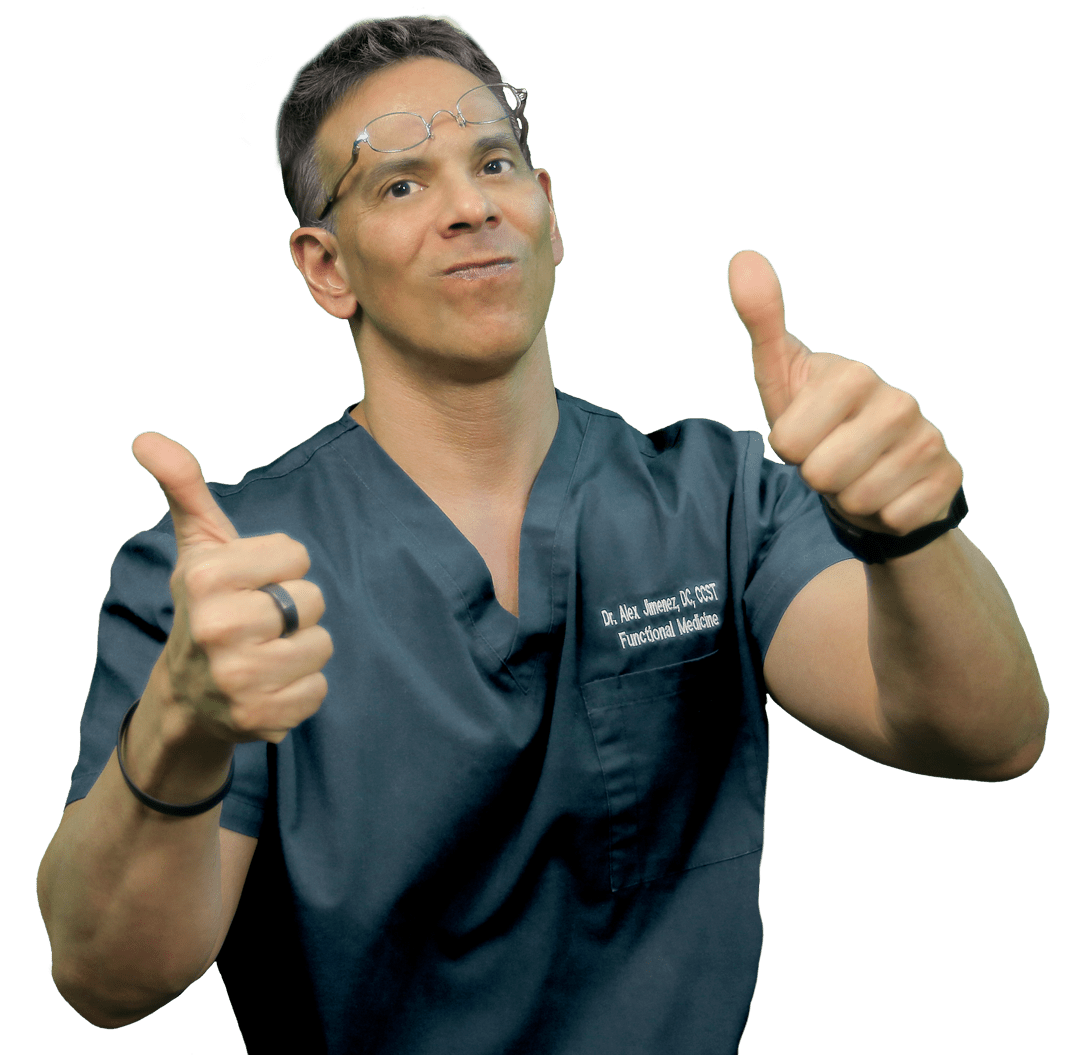Question: What is the difference between good pain and bad pain? My coach cautioned me that if I feel bad pain, that I should stop the activity. What does that mean?
Sports injury chiropractor Dr. Alexander Jimenez discusses the difference and the type of action to take.
‘No pain, no gain’: that famous cliché related to sports and physical fitness training, is frequently discovered but is not necessarily correct. Sometimes, pushing yourself and generating pain in the muscles is advantageous and other times it’s damaging. Physiotherapists and sports medics may be familiar with what are appropriate levels of pain which bring about benefits, and levels that are too stressful that will lead to injury. Fitness trainers and sports trainers may be less confident at making the distinction. This article (based on McFarland et al, 2003, Health and Fitness Journal 7(4), p 11-16) is a guide to trainers and coaches to help them identify one proper levels of training and two whether acute injuries have occurred or chronic injuries are progressing.
Table of Contents
What Is Too Much?
During a tough training session an athlete will begin to tire. Fatigue is a sign that the body is stressed. For a training effect to happen, the body requires stress to stimulate the muscles in order to grow back stronger. The body requires only the perfect quantity of stress at a suitable frequency to improve the training benefit. If the athlete is doing a conditioning session (for aerobic or anaerobic endurance), then an exhilarated feeling of fatigue at the end is the right degree of training. An athlete would not be able to maintain the intensity of work or would have to muster mental strength to maintain the intensity, by the end of a tough session. After a conditioning exercise, it is essential that the athlete refuels and then rehydrates his entire body, and rests. If conditioning sessions occur too often or with insufficient nutrition then the athlete’s performance might decline. This is a sign of ‘overtraining’, that the training program or workouts are past the athlete’s current physiology. In the event the athlete continues for a couple of days, assuming good nourishment, he should have the ability to work well again. If the athlete’s performance remains depressed even after two weeks of rest, then there may be a medical reason and also a sports doctor should be consulted
Pain That Persists
If an athlete performs strength training (lifting weights), then a specific level of muscle burn through a workout is going to be an appropriate indication that the athlete is training at the right level. This burn will generally cease the minute the exercise stops and begin again throughout another set of the workout. Any soreness or pain at a muscle felt during the performance of a workout that persists while the athlete is resting between sets might be a indication that the athlete has over-stressed the muscle or tendon. For example, if the shoulder joint is sore while lifting a heavy dumbbell and the soreness continues during the rest period while the athlete lifts his arm up and down, the odds are there is some level of injury.
In a strength session the athlete would ordinarily work two to five sets of one particular exercise with maybe 12-25 sets containing an entire workout of four to eight exercises. The athlete will have reduced strength performance following the exercise, maybe for a couple hours. For example, walking up stairs may feel a little tougher than usual.
At the 24-48 hours following a tough work out, an athlete could develop stiffness and soreness in the muscles. This is known as DOMS, or delayed onset muscle soreness. This is extremely common when an athlete starts a new type of training or the level of training is increased quickly. It’s also very typical in unconditioned adults following rare bouts of exercise. Eccentric exercise is also associated with elevated levels of DOMS.
Dealing With DOMS
A little DOMS is fine, some athletes even like it after a strength session as it tells them they have trained well, and also a small degree of DOMS is fine for athletes to continue their own training program. When an athlete is accustomed to the exercise or workout then the seriousness of DOMS is generally reduced or disappears entirely. DOMS that triggers serious stiffness, muscle tenderness or swelling to touch is a indication that the training has been too stressful. Full rest is recommended before continuing with training in this situation, otherwise the muscle tissues could be damaged.
The tendons also adapt to stress, in the exact same way that muscles do, getting better able to cope with high or repetitive forces. Too much too soon, can lead to tendinitis, which is associated with pain, stiffness and swelling. A fantastic indicator that the training has caused damage is when the tendinitis causes pain during regular daily activities, in addition to those connected with sport. For example, a knee may feel a little sore at the end of a four-mile run, suggesting patella tendinitis, however if this feeling stops once the run ends then the athlete has likely done little damage. If, however, the athlete wakes up the next morning and the knee feels sore walking up and down stairs then the injury should be taken more seriously.
Stress to the bones could be detected by the feeling of aching along the length of the bone. Any feeling like this should alert the athlete to a potential stress fracture and encourage him to see a sports physician.
Action To Take
Any critical muscle, bone or tendon pain that’s described above must be treated. There are four basic techniques of treatment that will help most athletes and should be carried out immediately:
Rest. This means avoiding any activity that stresses the painful area. Athletes can still do upper-body weights and swimming when, they have a leg injury . Aim to rest till pain symptoms have gone. If the pain occurs after rest, it’s a sure sign of an injury.
Ice. Useful at any time at controlling inflammation. Be cautioned, however, that if a muscle or joint needs to be constantly iced after each training session then more serious therapy and rest will be required. Ice works, but when it’s always needed to reduce pain, then the athlete is most likely pushing him or herself too hard.
Various Movement Exercises. Stiffness is frequently related to pain and increased resistance to movement will stop an injury from healing fully. Non-stressful movements which encourage the entire range-of-motion are helpful for almost any injured muscle or joint. Dynamic stretching exercises without weights work well.
Anti-inflammatory Medications. Over the counter medication is also helpful for reducing soreness.
Staying injury-free can be more of a challenge than training hard and getting fit. Understanding muscle soreness along with the appropriate levels and timescales of this pain will allow athletes and coaches to train at the right levels and rest for the proper time to avoid injury and optimize fitness.
Post Disclaimer
Professional Scope of Practice *
The information herein on "Athletes & Coaches: Difference Between Good Pain & Bad Pain" is not intended to replace a one-on-one relationship with a qualified health care professional or licensed physician and is not medical advice. We encourage you to make healthcare decisions based on your research and partnership with a qualified healthcare professional.
Blog Information & Scope Discussions
Our information scope is limited to Chiropractic, musculoskeletal, acupuncture, physical medicines, wellness, contributing etiological viscerosomatic disturbances within clinical presentations, associated somatovisceral reflex clinical dynamics, subluxation complexes, sensitive health issues, and/or functional medicine articles, topics, and discussions.
We provide and present clinical collaboration with specialists from various disciplines. Each specialist is governed by their professional scope of practice and their jurisdiction of licensure. We use functional health & wellness protocols to treat and support care for the injuries or disorders of the musculoskeletal system.
Our videos, posts, topics, subjects, and insights cover clinical matters, issues, and topics that relate to and directly or indirectly support our clinical scope of practice.*
Our office has reasonably attempted to provide supportive citations and has identified the relevant research studies supporting our posts. We provide copies of supporting research studies available to regulatory boards and the public upon request.
We understand that we cover matters that require an additional explanation of how it may assist in a particular care plan or treatment protocol; therefore, to further discuss the subject matter above, please feel free to ask Dr. Alex Jimenez, DC, or contact us at 915-850-0900.
We are here to help you and your family.
Blessings
Dr. Alex Jimenez DC, MSACP, RN*, CCST, IFMCP*, CIFM*, ATN*
email: coach@elpasofunctionalmedicine.com
Licensed as a Doctor of Chiropractic (DC) in Texas & New Mexico*
Texas DC License # TX5807, New Mexico DC License # NM-DC2182
Licensed as a Registered Nurse (RN*) in Florida
Florida License RN License # RN9617241 (Control No. 3558029)
Compact Status: Multi-State License: Authorized to Practice in 40 States*
Presently Matriculated: ICHS: MSN* FNP (Family Nurse Practitioner Program)
Dr. Alex Jimenez DC, MSACP, RN* CIFM*, IFMCP*, ATN*, CCST
My Digital Business Card



 Again We Welcome You¸
Again We Welcome You¸
